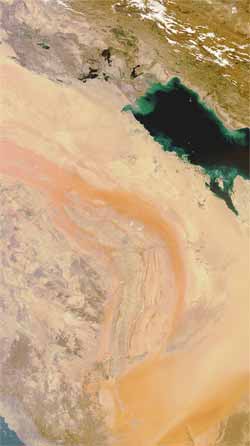Satellite captures images of sandstorm

The animation shows two cloud-free images of the region: the first captured on 10 March and the second on 18 March.
The latest image shows how sand has swept over the Persian Gulf States in recent days, extending some 1500 km north to south.
Over the past few days, strong winds have whipped up dust and sand, causing low visibility and grounding flights across the region.
In some areas of Saudi Arabia, schools have been closed and hundreds of people are suffering from respiratory problems. The storm has also caused a sharp decline in temperatures.
The storm has even disrupted traffic further south in the United Arab Emirates, Kuwait, Oman and Yemen.
These images were captured by Envisat’s MERIS instrument. This month, Envisat celebrated ten years in orbit.
Media Contact
All latest news from the category: Earth Sciences
Earth Sciences (also referred to as Geosciences), which deals with basic issues surrounding our planet, plays a vital role in the area of energy and raw materials supply.
Earth Sciences comprises subjects such as geology, geography, geological informatics, paleontology, mineralogy, petrography, crystallography, geophysics, geodesy, glaciology, cartography, photogrammetry, meteorology and seismology, early-warning systems, earthquake research and polar research.
Newest articles

Sea slugs inspire highly stretchable biomedical sensor
USC Viterbi School of Engineering researcher Hangbo Zhao presents findings on highly stretchable and customizable microneedles for application in fields including neuroscience, tissue engineering, and wearable bioelectronics. The revolution in…

Twisting and binding matter waves with photons in a cavity
Precisely measuring the energy states of individual atoms has been a historical challenge for physicists due to atomic recoil. When an atom interacts with a photon, the atom “recoils” in…

Nanotubes, nanoparticles, and antibodies detect tiny amounts of fentanyl
New sensor is six orders of magnitude more sensitive than the next best thing. A research team at Pitt led by Alexander Star, a chemistry professor in the Kenneth P. Dietrich…





















